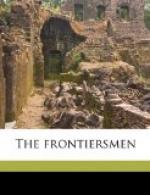“I set the Great Bear after Amoyah for you! I made the Eeon-a acquainted with his boastful lies, and he bewitched Amoyah’s ball-sticks that his fine play might come to nothing.”
Very little to the purpose, the disaffected man of facts reflected, remembering the impression produced by his rival’s display of skill. Somehow Amoyah seemed beyond the reach of logic. “Why did you not instead bewitch the woman?” Tus-ka-sah asked.
But this wiliest of the cheera-taghe shook his head.
“If she had been a mere woman,” he said. “But a widow is a witch herself.”
“Eeon-a, Ha-hoo-jah! Eeon-a, Ha-hoo-jah!" sang Amoyah at the door of the winter house.
Eeon-a, the Great Bear, made no sign and slept in peace at his town house in the mountains.
And since then, as always before, under the first icy moon of the winter the company of bears with their feather-crested shadows take up their mysterious march seven times around the “beloved square” of their ancient secluded town in the Great Smoky Mountains, which it is said may be seen to this day—by all who can find it!
THE VISIT OF THE TURBULENT GRANDFATHER
It was long remembered in the Cherokee nation. Their grandfather came to the Overhill towns on the banks of the Tennessee River in a most imperious frame of mind.
“Give me a belt!” he cried in irrelevant response to every gracious overture of hospitality. For although presents were heaped upon him, the official belt of the Cherokee nation was not among them, and he cast them all aside as mere baubles.
Even the clever subterfuges of that master of statecraft, the half-king, Atta-Kulla-Kulla, might not avail. “N’tschutti!” (Dear friend) he said once in eager propitiation; “Gooch ili lehelecheu?” (Does your father yet live?) He spoke in a gentle voice and slowly, the Delaware language being unaccustomed to his lips. “Tell the great sakimau I well remember him!” And he laid a string of beads on the arm of the quivering Lenape, for their grandfather was of that nationality.
But what flout of Fate was this? Not the coveted string of wampum, the official token, its significance not to be argued away, or overlooked, or mistaken—but instead a necklace of pearls, the fine freshwater gems of the region, so often mentioned by the elder writers and since held to be mythical or exaggeration of the polish of mere shell beads till the recent discoveries have placed once more the yield of the Unio margaritiferus of the rivers of Tennessee on metropolitan markets.
A personal gift—of the rarest, it is true—but a mere trifle in the estimation of Tscholens, in comparison with that national recognition which he craved and which a tribe of warriors awaited.




